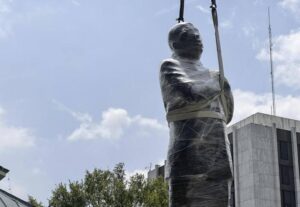Musa Hasahya Kasera, a 68-year-old man from Uganda, is facing mounting anxiety over the future of his enormous family. With 12 wives, 102 children, and approximately 578 grandchildren, his home in Bugisa Village, Butaleja District, has become a notable site, drawing attention from local and international visitors, including media organizations. However, the sheer size of his family has created significant challenges, leaving him overwhelmed and struggling to provide for them.
Hasahya’s children range from 10 to 50 years old, and his youngest wife is under 40. The family patriarch admits that remembering the names of his wives, children, and grandchildren has become nearly impossible. He relies on one of his sons, 30-year-old schoolteacher Shaban Magino, to help manage the family’s basic needs. Despite his efforts, Hasahya could only afford to provide a basic education for a few of his children.
In his youth, Hasahya was a successful farmer and businessman. He was well-respected within his community and served as its chairman. His wealth and status attracted multiple marriage offers, leading him to marry 12 wives over the years. With ample resources, he initially believed he could manage such a large household. However, as his health declined and his income dwindled, the strain of supporting his expanding family became overwhelming.

The large family currently resides in a rundown 12-bedroom house. The burden of caring for such a vast household has taken a toll on Hasahya’s health and financial situation. His deteriorating condition, limited land, and inability to continue farming have led to significant hardships. Two of his wives left due to a lack of basic necessities like food, education, and clothing. In response, Hasahya encouraged his remaining wives to adopt family planning measures, though he personally chose not to use contraceptives. Reflecting on his past decisions, he acknowledged his mistakes and vowed not to have more children due to limited resources.
Also, read; Joel Embiid Hints at Potential 2028 Olympics Switch to Represent Cameroon After Receiving National Honor
Hasahya’s family traces its origins to a traditional lifestyle rooted in polygamy and large families. In 1972, he married his first wife, Hanifa, and a year later, their first child, Sandra Nabewire, was born. Influenced by his relatives, who encouraged him to expand his family, Hasahya continued marrying more women and having more children. In his prime, he provided his wives with farming tools to cultivate the fertile land, ensuring the family’s sustenance. However, as the years passed, the rising cost of living and the growing size of his family depleted his resources.
Despite the challenges, Hanifa, his first wife, described Hasahya as a caring and attentive man who treats everyone equally. His wives and adult children often engage in menial jobs like fetching water, sweeping, and other domestic chores to supplement the family’s income.
Uganda’s legal framework allows polygamy under certain religious and traditional practices. However, child marriage has been banned since 1995. In Hasahya’s rural community, the majority of residents engage in subsistence farming and cattle rearing. The local culture and traditions have historically supported polygamous practices, though the challenges faced by Hasahya’s family highlight the struggles that can arise from such lifestyles in a rapidly changing society.
As Hasahya’s fortunes dwindle, he is appealing to the government for assistance in supporting his children’s education and meeting other essential needs. Despite the challenges, he remains committed to his family but advises others against following his path of marrying multiple wives. His story serves as a cautionary tale, reflecting the complexities of managing large families in the face of evolving social and economic conditions.




